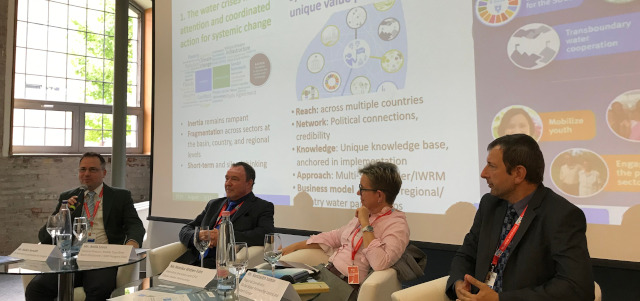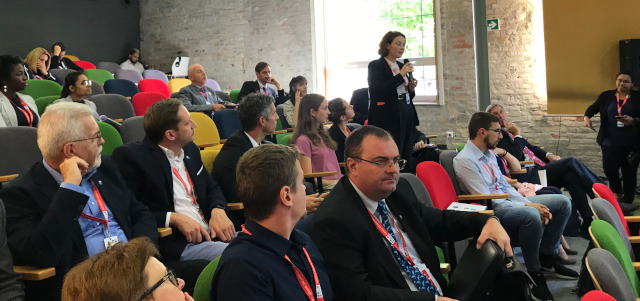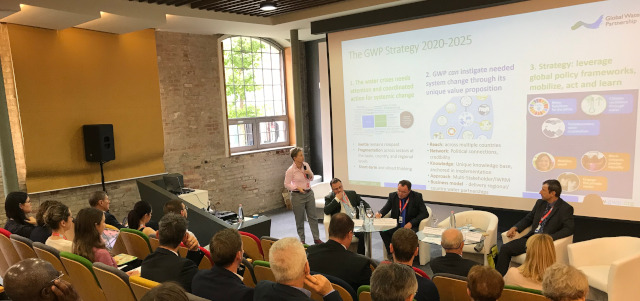On 16 October 2019, GWP CEE convened a session ”Who is at the Table? Mobilizing for a Water Secure World” at Budapest Water Summit, a high-level event for the region of Central and Eastern Europe. The session introduced GWP's new Strategy, which lays out the areas of action and impact the Network will collectively pursue in the period from 2020 to 2025. The event focused on the indispensable role that must be played by broad, inclusive multi-stakeholder partnerships, which together mobilize to prevent water crises and to provide the solutions, governance, technology, financing) to solve water problems.
The panel, consisting of Ms. Monika Weber-Fahr, GWP Executive Secretary and CEO, Konstantin Ivanov, GWP CEE Regional Coordinator, Mr. Attila Lovas, GWP Hungary Chair and Middle Tisza River Basin Directorate General Director and Mr. Balázs Horváth, EUSDR PA4 Co-coordinator for Hungary, aimed to present global, regional, river-basin and country perspectives.
Mobilizing all for a water secure world
Dr Monika Weber-Fahr, Global Water Partnership’s Executive Secretary and CEO presented the new GWP Strategy (2020-2025) and pointed out it is about urgency and that poverty, pollution, conflicts, floods, droughts and migration are all water related, so there is urgent need to manage our water better and embrace the new opportunities that come. GWP will strategically work in areas where global and regional policy frameworks exist and bring leadership focus, progress measurement, development partner action, and potential for financing to provide water solutions to the Sustainable Development Goals, catalyze climate-resilient development and enhance transboundary cooperation. In the new Strategy, GWP has set clear and measurable targets, aims for growth through programmatic funds and will continue to grow as a learning organization.
The regional perspective
For GWP Central and Eastern Europe, the New Strategy is an opportunity to better address the water challenges in Central and Eastern Europe, by involving more stakeholders and sectors, including the private sector. GWP CEE Regional Coordinator Konstantin Ivanov emphasized that in the new 3-year period, GWP CEE will focus on continuing the transboundary cooperation in the region, working together with River Basin Commissions, but also bringing new actors. Climate resilience is also one of the leading topics and GWP CEE is interested in sharing the extensive experience on droughts and floods to help the region adapt better to climate change. Another regional focus will be on nature-based solutions, sustainable sanitation and small water retention measures. During the past few years, youth engagement has also been very strong in the region, and GWP CEE will continue in its mission to support young water professionals and their engagement in water governance.
More attention towards transboundary cooperation is needed
Attila Lovas, GWP Hungary Chair and Middle Tisza River Basin Directorate General Director pointed out that more attention is needed towards the transboundary water management and all actors should be involved. GWP Hungary will continue working as a multi-stakeholder platform in the country and support the mission of GWP. “Integrated planning is the key towards better water management, and this is what we need to bring more often to the table at all levels.”, said Mr Lovas.

Balasz Horvath, EUSDR PA4 Co-coordinator for Hungary introduced the EU Strategy for the Danube Region (EUSDR) and explained how the countries in the Danube Region cooperate in different areas and Priority Area 4 (Water Quality) and 5 (Environmental Risks) are working very closely with GWP CEE. He acknowledged the contribution of GWP CEE in stakeholder engagement for the updated Tisza River Basin Management plan and the outreach activities in all 5 countries. JOINTISZA project has been a great example of strengthening the transboundary cooperation between the five countries of Tisza river basin, that led to the Updated Tisza River Basin Management that will enhance the status of waters of the whole basin.
"One cannot have an intelligent discussion on water if we don’t bring all important stakeholders around the table. As a multi-stakeholder group, we will only be successful if we work with other institutions that aim for systems change. The connection with global processes like the SDGs is a must, and we need to mobilize all actors - businesses, youth, women’s groups.", closed the session Monika Weber-Fahr.

